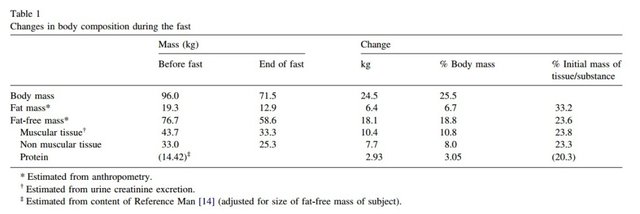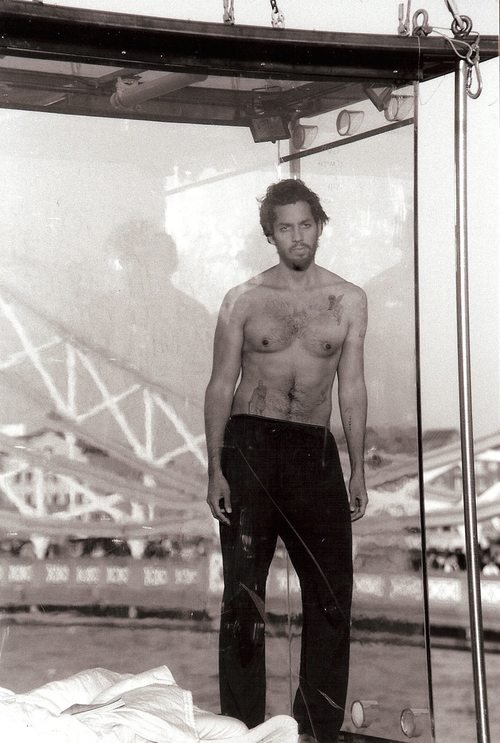David Blaine Didn't Eat for 44 Days - Here's how his Body Composition Changed [Research]

David Blaine, an endurance artist, experimented with total food deprivation - in front of a crowd. He did not eat anything between September 5 and October 19, 2003.
“A 30-year-old male, weight 96 kg, height 1.84 m, entered a transparent Perspex box on the banks of the river Thames in London and was suspended in the air from a crane for 44 days. During this period, he took only water to drink.”*
I found out about his experiment a short while ago and I wanted to see if I can find some research data about it. And I did. There are at least 3 scientific studies written on Blaine's experiment.
Let's see some numbers:

So, at the end of the experiment, David Blaine was 24.5kg lighter. Even though his situation was not life threatening, he was admitted to the hospital for careful intense refeeding (for 5 days).
Researchers took a lot of measurements before, after, and during the experiment (daily urine tests). However, by modern means, these measurements cannot be perceived as being very accurate. But, even so, they are useful. Here's another photo:

From the experiment
- Blaine lost 10.4kg of muscle
- He developed some nutritional deficiencies (B-vitamins, low potassium, low vitamin A...)
- Two weeks in - he experienced faintness and dizziness upon standing up quickly
- He developed sharp shooting pains in his trunk and limbs
- He experienced nausea and abdominal discomfort
- He found time for some reading/journaling

Endnotes
Overall, there is nothing unusual from Blaine's experiment that does not show up in people who fast (don't eat anything, only drink water) for prolonged periods of time. In fact, compared to a person who fasted for 382 days (I wrote about it here), Blaine seems to have done worse. But he fully recovered from his experiment, showing the amazing endurance capability of the human body.
If you're a geek and you want to see additional data from the 3 scientific studies, I wrote a more detailed review on Blaine's fast on my blog.
I'll leave you with a quote from Blaine:
“I think to be able to survive something like this proves that we can live with nothing…Everybody wants domination, wants to own and control everything and believes that money and diamonds and riches and all this stuff is what life is about, but, you know, at the end of the day that really means nothing…there is no value in that.”*
If you like this report and you want to stay close, follow @cristi
Cristi Vlad, Self-Experimenter and Author
While fasting has been proven to cleanse the system and digestive tract, this is just organ failure waiting to happen
in many severe cases, it happens. severe = people not being physically/physiologically prepared to undergo a fast
It is a very bad thing to do, losing muscle mass is not good. If people want to lose fat then excercise is the way not fasting.
Also if people fast, they lose vitamins, and minerals from their body, which leads to hundreds of diseases.
Freddy, it's not quite like that. People adapted to burn adipose tissue for fuel would experience minimal mass loss if they do a couple of days of total fasting. Five to Ten days every couple of months - I would say. They are less likely to experience hunger and other possible negative symptoms associated with adaptation to fasting (burning your own fat) compared to non-adapted people (those who rely primarily on glucose for energy). Sugar burners (people who burn primarily glucose) have to go through a phase of adaptation of a few days when they catabolize muscle at a higher rate until they are able to efficiently metabolize fat. But they eventually adapt as well. Blaine was in the second category.
Plus, keep in mind that in this experiment they didn't use acurate measurement tools; they mostly used skinfold calipers to estimate bodyfat and they calculated/estimate protein catabolism from urinary nitrogen loss. Modern means involve body composition scanners (dexa) and other more accurate means.
Yes a little bit of fasting is not bad, I was referring to 44 days lenght.
Many religious people do fast, and that is sometimes even beneficial for them if they eat garbage food, the body has time to cleanse itself.
Not eating for 1 day and drinking a lot of herbal tea is sometimes the best detoxification method available.
I agree, but most people think they'd starve to death if they dont eat every couple of hours :)
"I think to be able to survive something like this proves that we can live with nothing…Everybody wants domination, wants to own and control everything and believes that money and diamonds and riches and all this stuff is what life is about, but, you know, at the end of the day that really means nothing…there is no value in that." Awesome quote. "To convert pounds of body weight to kilograms, divide by 2.2. For example, a 150-pound adult weighs 68 kilograms." ~From healthyeating.sfgate.com For those of us that have no idea what a kilogram is :)
thanks for the feedback!
My longest fast was three days, when I was sixteen, with somewhat regular cycles of hunger as my blood sugar oscillated every few hours. Only really intense for about twenty minutes at a time.
Your previous year-long fast post reminded me that Jack London's story "The Love of Life" also mentions the fading of hunger. I always wondered how much personal experience he had with it. This particular short biography seems more interested in his sex life than in extreme living, though it does get some analysis in psychological terms.
http://www.newyorker.com/magazine/2013/10/28/four-legs-good